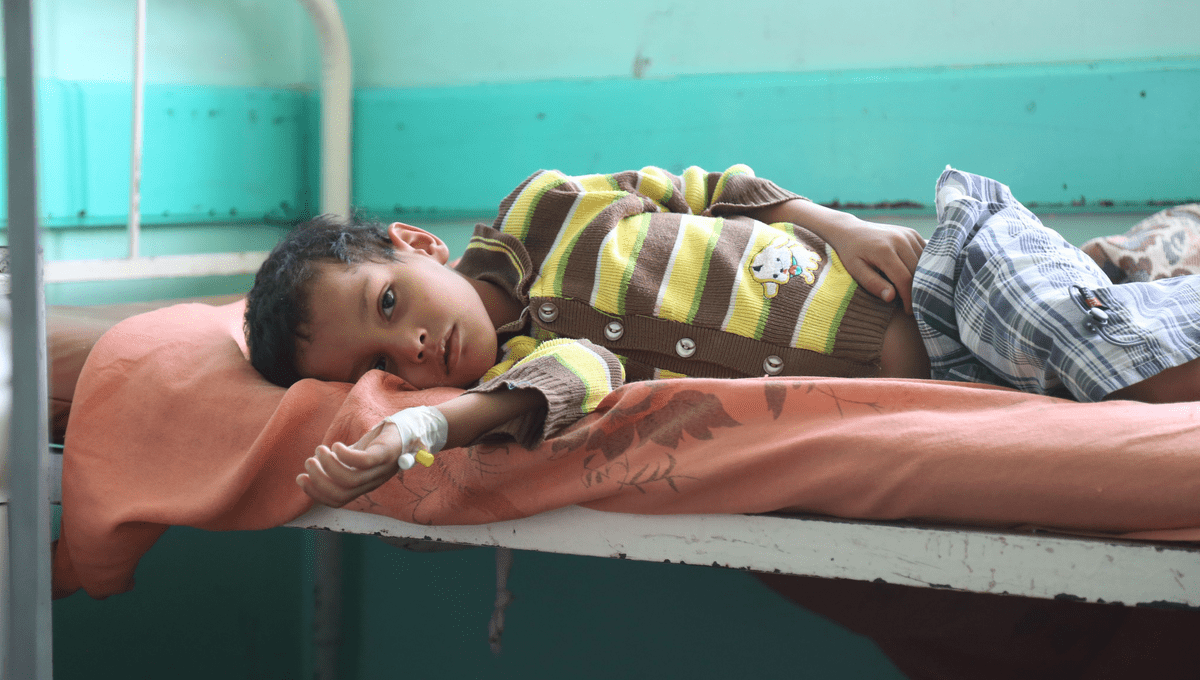
Worldwide, cases of cholera, the deadly but treatable disease that kills its victims in a particularly messy way – to put it bluntly, you vomit and diarrhea yourself to death – have soared this year, leaving health agencies across the globe scrambling to cope with the increased demand for vaccines.
The disease is being reported from the Caribbean to Africa, across the Middle East and South Asia, both in countries where cholera is a common threat and in places where it’s not been seen for decades. The uptick in numbers, experts warn, is thanks to the increasingly unpredictable and dramatic weather patterns that have forced millions of people from their homes this year – and that means something even worse is true: this is probably only the beginning.
“The situation is very concerning, very worrying,” Philippe Barboza, who leads the World Health Organization’s (WHO) cholera response, told the New York Times. “We have had to worry about war and poverty and population movements, and that has not changed. But now we have climate change on top of that.”
Cholera may be a disease we mostly associate today with sickly Victorian children dying horribly for want of an education in water contamination, but in fact, this supposedly antiquated infection still affects millions of people worldwide, racking up an annual death toll that can easily reach into the hundreds of thousands. It’s worst in children – although it’s not exactly nice for anybody – and if left untreated, it can cause death within a single day for those infected.
Its technique is as simple as it is effective: it causes the body to violently expel fluids from each end until the victim simply dies from shock induced by sudden dehydration. Despite these grisly details, it’s not an unstoppable killer: thanks to the acid in our stomachs, small amounts of the cholera bacteria can often be killed inside the gut, and so most people who contract the bacteria only show mild to no symptoms.
Even for those with stronger symptoms, quick treatment with oral or intravenous rehydration is usually very successful, and in places where resources are plentiful, fewer than 1 percent of those infected will die from the disease. But that’s not the situation being seen across the world right now – and so, despite being relatively easy and cheap to treat, the WHO has warned that deaths from cholera are accelerating at a concerning rate this year.
“Since January this year, 29 countries have reported cholera cases, including Haiti, Malawi and Syria which are facing large outbreaks,” noted a recent WHO press release. “In comparison, in the previous five years, fewer than 20 countries on average reported outbreaks.”
In fact, so sharp is the rise in case numbers that, for the first time, health authorities are having to make the difficult decision to ration out vaccines.
“It leaves you sitting at a table literally having to have conversations like, well, do we send it to Haiti or do we send it to Syria?” Daniela Garone, the international medical coordinator for Medicine sans Frontiers, told the Times.
The WHO’s International Coordinating Group (ICG), the body which manages emergency supplies of vaccines, announced last month that it was temporarily suspending the standard two-dose regimen for cholera vaccinations: instead, medical response teams will deliver single doses only to those in need.
“There is just not enough vaccine,” Garone said. “And it’s the chicken or the egg: Do you prevent or you react? At the moment we are only on the reacting, trying to prevent mortality, and we cannot prevent.”
Halving the dosage like this shouldn’t reduce the amount of immunity offered by the vaccines, Barboza explained, but it will shorten the length of time the protection is effective.
Unfortunately, only very few manufacturers make a cholera vaccine, and production is already straining at capacity. Even for companies who have the ability to join the effort, immediate financial incentives for doing so are low since cholera vaccines are cheap – they sell for about $1.50 per dose, per the New York Times, which is roughly one-thirteenth of a COVID-19 vaccine. And while more companies are beginning to enter the fray, “even a sharp increase in production will be low compared to the need,” noted Barboza.
And with the effects of cataclysmic climate change growing ever more present, it’s likely we’re seeing just the tip of the oncoming tidal wave. With events like flooding, droughts, and wars, huge numbers of people are driven from places with clean water and infrastructure and into overcrowded places where disease can run rampant through a population. For example, Barboza explained, “when water is scarce you can have people packed even more closely, perhaps all using a single spring that is not protected.”
“More people means more risk of contamination,” he said. “They don’t have water to wash, or to wash their vegetables, and it’s a spiraling effect.”
And as governments worldwide repeatedly fail to meet climate goals, that’s likely something we’re going to see much, much more of in future.
“We have never had to make a decision like this about vaccination before, that’s the severity of this crisis,” Barboza told the Times. “[It’s] a fire that is just going to keep getting bigger.”
Source Link: Cholera Outbreaks Rise Across The Globe As Vaccine Stocks Rationed